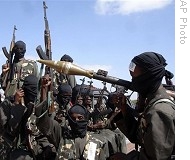voa标准英语2008-Ethiopian Army Sets Up New Bases in Somalia
搜索关注在线英语听力室公众号:tingroom,领取免费英语资料大礼包。
(单词翻译)
The Ethiopian army, which had announced it would pull out of Somalia by the end of the year, is reportedly establishing new bases in central Somalia and has yet to withdraw from key positions in the capital Mogadishu. In recent days, Addis Ababa has hinted it would extend the deployment1 of its forces in response to intensified2 efforts by militant3 Islamists to take over key towns.Somali journalist Abdikarin Bulhan tells VOA that Ethiopian troops on Monday took control of the border town of Balanbal in the northern Galgadud region and established a new base on the town's outskirts4.
 |
| Armed fighters from the Al-shabab insurgent5 group prepare to travel on the back of pickup6 trucks outside Mogadishu in Somalia, 8 Dec 2008 |
Bulhan says 10 truckloads of Ethiopian troops moved into Balanbal, about 15 kilometers away from the border, following reports that militant Shabab fighters had taken over Galgadud's provincial7 capital Dusamareb, the town of Mataban in the Hiran region, and the commercial city of Guri'el within in the past two days.
The journalist says the Ethiopians shut down businesses and cut communications in Balanbal after they took control of the town.
Further south in the Bay region, residents in the town of Burhakaba report that Ethiopian troops, armed with artillery8 and other heavy weapons, established a new military base there after forcing Islamist fighters to abandon the town on Sunday.
The Ethiopian foreign ministry9 said on Saturday that the government was willing to briefly10 delay troop withdrawal11 to allow some 3,000 African Union peacekeepers currently deployed12 in Somalia to take over security.
The African Union says it does not have enough troops on the ground to take over security from Ethiopia and has requested troops from the United Nations.
Shabab at forefront of insurgency13
Burhakaba lies 30 kilometers south of the provincial capital of Baidoa, where Somalia's transitional parliament is based, and is on the road that links Baidoa to the capital Mogadishu. Several bombings, blamed on the Shabab, have killed and wounded dozens of people in Baidoa in recent weeks. The Shabab, which the United States has labeled a terrorist organization because of its alleged14 ties to al-Qaida, has been at the forefront of a two-year, Islamist-led insurgency against Ethiopia and the secular15 U.N.-backed government it has propped16 up in Somalia since late 2006.
The Islamists have regained17 control in most parts of southern and central Somalia in recent months. But the movement is divided between moderates and extremists, prompting concerns that if Ethiopia pulled out of Somalia, violence among Islamist groups could further deepen the humanitarian18 crisis in the country.
Fighting between Ethiopian and Somali troops and insurgents19 is estimated to have killed as many as 10,000 people, displaced more than 1 million and plunged20 3 million others into dire21 poverty.
Human Rights Watch report condemns22 all parties involved in conflict
A new report by the U.S.-based Human Rights Watch group, released on Monday, condemns all sides in the conflict for causing Somalia to descend23 into the worst chaos24 it has seen since the fall of the country's last government in 1991.
The report's author, Chris Albin-Lackey, tells VOA that major donor25 nations supporting the Ethiopian-backed government have never properly addressed repeated allegations of human rights abuses and war crimes committed by government and Ethiopian troops against thousands of Somali civilians27.
Albin-Lackey says in the perceived absence of justice and in the belief that the West continues to support Ethiopia and the government unconditionally28, Somalis are increasingly turning to radical29 Islamists, hoping the Shabab and their allies can restore law and order.
"The bottom line is that Ethiopia, the transitional federal government, and insurgent forces have all managed to do more damage to the civilian26 population of Somalia than to one another," he said. "At the same time, the international community as a whole has completely failed to intervene effectively in Somalia and, in fact, a number of key international actors, including the United States, have in some cases actually made the situation worse through some of their actions. These past two years of violence and brutality30 are the primary reason why the extremist groups, including al-Shabab, have gained so much power."
The Shabab functioned as the military wing during the Islamic Courts Union's brief six-month rule and aims to impose strict Islamic laws in Somalia.
 收听单词发音
收听单词发音 




